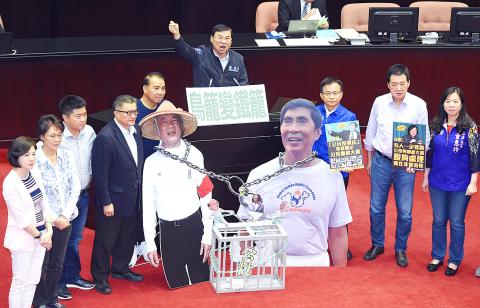Lawmakers yesterday passed an amendment to the Referendum Act (公民投票法) to decouple referendums from national elections.
The amended act stipulates that referendums are to be held on the fourth Saturday of August once every two years, starting in 2021.
The amendment was passed after lawmakers earlier in the day approved a proposal by Democratic Progressive Party (DPP) caucus whip Ker Chien-ming (柯建銘) and 66 others to hold a provisional session from yesterday through July 5 to review proposed amendments and laws.

Photo: Liao Chen-huei, Taipei Times
A procedural committee meeting was held at noon, followed by the first plenary session in the afternoon.
Plenary sessions are to be held today and tomorrow, with a second round of sessions to be held on Thursday, Friday and Thursday next week.
A third round is to be held on Friday next week and from July 1 to 5.
DPP lawmakers, who hold the legislative majority, ensured that voting at the committee meeting gave priority to dealing with proposed changes to the Referendum Act, the National Security Act (國家安全法), the Act for Industrial Innovation (產業創新條例), the Agricultural Products Market Transaction Act (農產品市場交易法) and the Food Administration Act (糧食管理法).
Chinese Nationalist Party (KMT) caucus secretary-general John Wu (吳志揚) had previously condemned the referendum bill’s advancement to the legislative floor after the DPP caucus on May 17 sent the proposal by DPP Legislator Chiang Chieh-an (蔣絜安) to a second reading without undergoing a committee review.
KMT lawmakers were holding a news conference on same-sex marriage bills at the time.
Chiang’s version included a clause that would have required people to present photocopies of their national ID cards when signing referendum petitions.
The requirement has faced opposition from several sectors of society, including the KMT, which has said it would be contravene democratic principles.
The DPP caucus had argued that the requirement would prevent bogus signatures and the names of dead people being used.
However, it agreed to remove the clause and said it would ask the Central Election Commission to deal with the issue of fake signatures, Ker said.
The commission should set up systems to identify and remove fake signatures, and to collect electronic signatures, he added.
Decoupling the referendums from national elections would help prevent a recurrence of long lines, slow voting and delayed results that occurred during the Nov. 24 elections last year, when 10 referendums were held alongside local elections, Ker said.

The Ministry of Foreign Affairs (MOFA) yesterday said it is closely monitoring developments in Venezuela, and would continue to cooperate with democratic allies and work together for regional and global security, stability, and prosperity. The remarks came after the US on Saturday launched a series of airstrikes in Venezuela and kidnapped Venezuelan President Nicolas Maduro, who was later flown to New York along with his wife. The pair face US charges related to drug trafficking and alleged cooperation with gangs designated as terrorist organizations. Maduro has denied the allegations. The ministry said that it is closely monitoring the political and economic situation

Conflict with Taiwan could leave China with “massive economic disruption, catastrophic military losses, significant social unrest, and devastating sanctions,” a US think tank said in a report released on Monday. The German Marshall Fund released a report titled If China Attacks Taiwan: The Consequences for China of “Minor Conflict” and “Major War” Scenarios. The report details the “massive” economic, military, social and international costs to China in the event of a minor conflict or major war with Taiwan, estimating that the Chinese People’s Liberation Army (PLA) could sustain losses of more than half of its active-duty ground forces, including 100,000 troops. Understanding Chinese

UNRELENTING: China attempted cyberattacks on Taiwan’s critical infrastructure 2.63 million times per day last year, up from 1.23 million in 2023, the NSB said China’s cyberarmy has long engaged in cyberattacks against Taiwan’s critical infrastructure, employing diverse and evolving tactics, the National Security Bureau (NSB) said yesterday, adding that cyberattacks on critical energy infrastructure last year increased 10-fold compared with the previous year. The NSB yesterday released a report titled Analysis on China’s Cyber Threats to Taiwan’s Critical Infrastructure in 2025, outlining the number of cyberattacks, major tactics and hacker groups. Taiwan’s national intelligence community identified a large number of cybersecurity incidents last year, the bureau said in a statement. China’s cyberarmy last year launched an average of 2.63 million intrusion attempts per day targeting Taiwan’s critical

‘SLICING METHOD’: In the event of a blockade, the China Coast Guard would intercept Taiwanese ships while its navy would seek to deter foreign intervention China’s military drills around Taiwan this week signaled potential strategies to cut the nation off from energy supplies and foreign military assistance, a US think tank report said. The Chinese People’s Liberation Army (PLA) conducted what it called “Justice Mission 2025” exercises from Monday to Tuesday in five maritime zones and airspace around Taiwan, calling them a warning to “Taiwanese independence” forces. In a report released on Wednesday, the Institute for the Study of War said the exercises effectively simulated blocking shipping routes to major port cities, including Kaohsiung, Keelung and Hualien. Taiwan would be highly vulnerable under such a blockade, because it